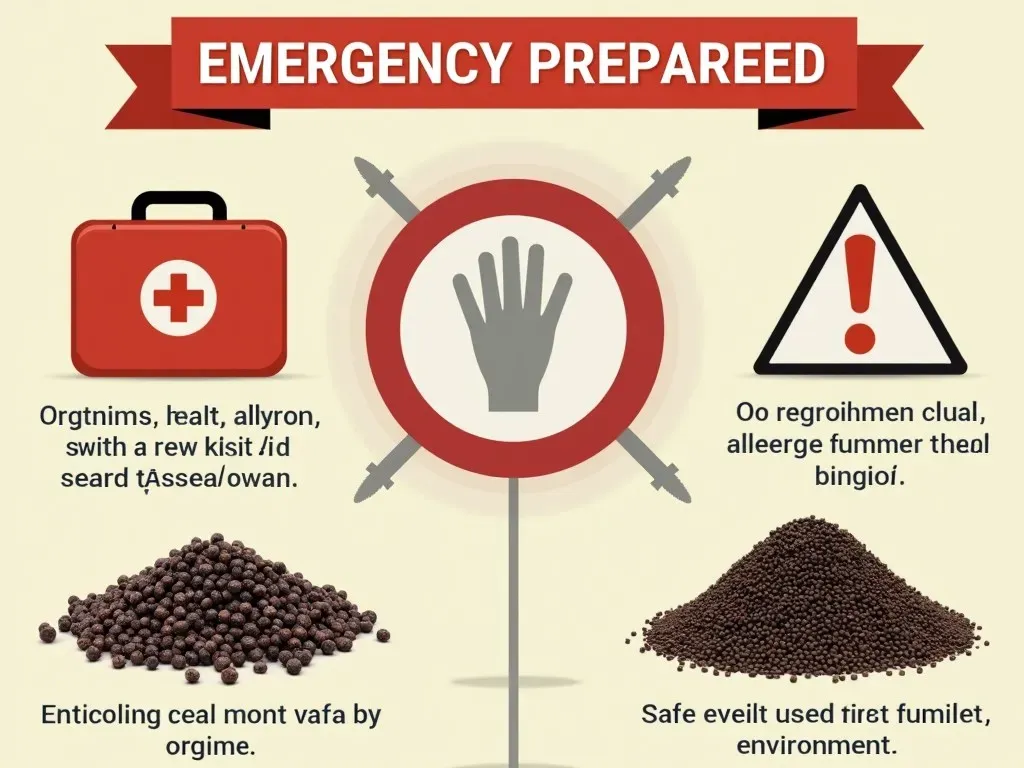Black pepper allergy is a condition that affects certain individuals, leading to a range of allergic reactions upon the consumption of this popular spice. Despite its frequent use in kitchens worldwide, the allergy to black pepper can be serious and often underdiagnosed. Symptoms range from mild discomfort to severe reactions, demanding awareness and caution among those who are susceptible.
Understanding Black Pepper Allergy
Black pepper, known scientifically as Piper nigrum, is commonly found in households as a seasoning. While it adds flavor to food, for some, it poses significant health risks. An allergic reaction to black pepper occurs when the immune system responds adversely to proteins present in the peppercorns. According to research, the allergy is quite rare compared to Other food allergies, but it can still provoke severe symptoms in those affected.
Symptoms of Black Pepper Allergy
Recognizing the symptoms of black pepper allergy is critical for effective management. Symptoms can manifest shortly after consuming black pepper and may include:
- Itchiness: Often localized around the mouth, eyes, and other areas of the skin.
- Gastrointestinal Issues: Abdominal pain, nausea, vomiting, and diarrhea.
- Respiratory Symptoms: Nasal congestion, runny nose, sneezing, coughing, and difficulty breathing.
- Dermatological Reactions: Hives, redness, and rashes.
| Symptom Type | Common Symptoms |
|---|---|
| Skin | Itchiness, hives, redness |
| Gastrointestinal | Nausea, vomiting, diarrhea, abdominal pain |
| Respiratory | Sneezing, coughing, difficulty breathing |

How Common Is Black Pepper Allergy?
Although definitive statistics on black pepper allergy cases are sparse, it is estimated to be one of the less prevalent spice allergies, affecting approximately 0.1% to 1% of the population. This rarity contributes to a lack of awareness and understanding, which can lead to misdiagnosis and improper management.
Diagnosing Black Pepper Allergy
The diagnosis of black pepper allergy typically involves several steps:
- Medical History Review: Physicians will review the patient’s health history, focusing on allergic reactions and symptoms experienced with pepper consumption.
- Skin Prick Tests: These tests can help identify sensitivities to black pepper by exposing the skin to allergens.
- Blood Tests: Specific IgE tests can confirm sensitization to black pepper proteins.
It is crucial for individuals with suspected allergies to consult an allergist, as they can provide a comprehensive assessment and a tailored management plan.
Cross-Reactivity and Caution
Some individuals allergic to black pepper may also have sensitivities to other spices or plants. This phenomenon, known as cross-reactivity, can complicate dietary choices. Spices in the nightshade family, for example, including bell peppers and tomatoes, may exacerbate allergic responses in sensitive individuals.
Managing Black Pepper Allergy
Individuals diagnosed with a black pepper allergy need to adopt a proactive approach to manage their condition effectively:
Dietary Modifications
- Read Labels: While researching options, always check ingredient labels for undisclosed black pepper.
- Experiment with Alternatives: Consider using alternative spices like oregano, basil, or paprika that can provide flavor without triggering allergic reactions.
Emergency Preparedness
For those with a known black pepper allergy, it is essential to have an emergency action plan, including:
- Carrying Antihistamines: Fast-acting antihistamines can mitigate mild allergic reactions.
- Epinephrine Auto-Injector: Individuals with a history of severe reactions should carry an epinephrine injector (EpiPen) for emergencies.

Black Pepper Sensitivity vs. Allergy
It’s important to distinguish between black pepper allergy and black pepper sensitivity. Sensitivity may lead to discomfort or digestive disturbances without invoking the immune system’s response found in allergies. Symptoms associated with intolerance may include:
- Bloating
- Gas
- Stomach pain
Recognizing Intolerance Symptoms
| Symptom | Description |
|---|---|
| Bloating | Swelling in the abdominal area |
| Gas | Excessive gas production |
| Stomach Pain | Discomfort or cramping |

Frequently Asked Questions (FAQs)
Can you be allergic to black pepper?
Yes, it is possible to develop an allergy to black pepper, although it is relatively uncommon compared to other food allergies.
What are the symptoms of black pepper allergy?
Symptoms vary but can include itchiness, gastrointestinal discomfort, respiratory issues, and skin reactions like hives.
How is black pepper allergy diagnosed?
Diagnosis is typically done through a combination of medical history, skin prick tests, and blood tests that measure specific IgE antibodies to black pepper proteins.
What should I do if I experience an allergic reaction to black pepper?
If you suspect an allergic reaction, seek medical assistance immediately. For severe reactions, administer an epinephrine auto-injector and call emergency services.
Are there alternatives to black pepper?
Alternatives include spices like oregano, basil, thyme, or cayenne pepper. Always consult with a healthcare provider, especially for dietary adjustments in case of allergies.
In conclusion, while black pepper is a staple in many diets, it is vital to recognize the potential risks associated with its consumption for those with allergies. By understanding symptoms, diagnosis, and effective management strategies, individuals can safely navigate their culinary experiences. Keeping informed and proactive can significantly enhance quality of life and prevent serious allergic reactions. For more detailed insights, you may refer to resources like Verywell Health.
